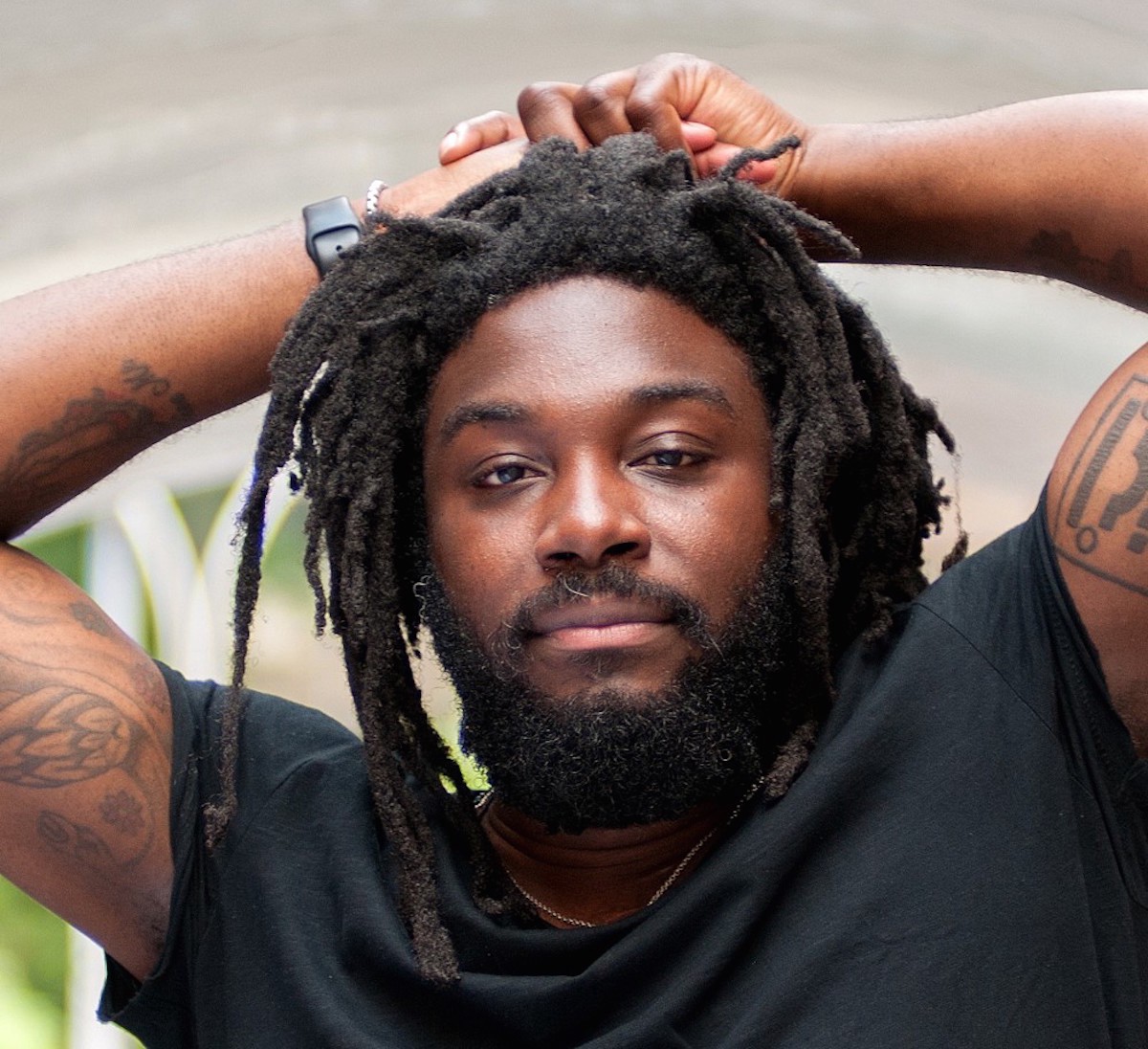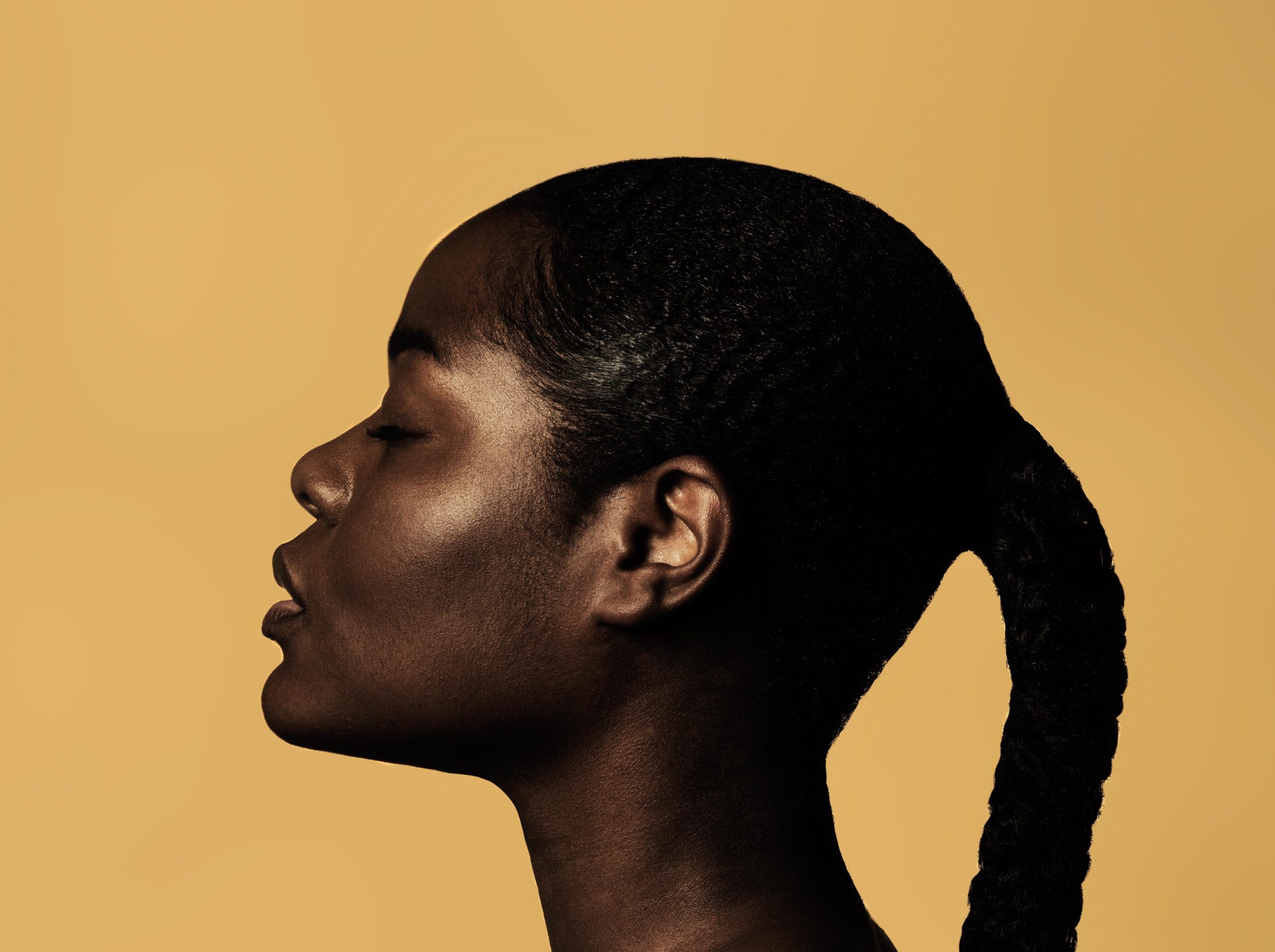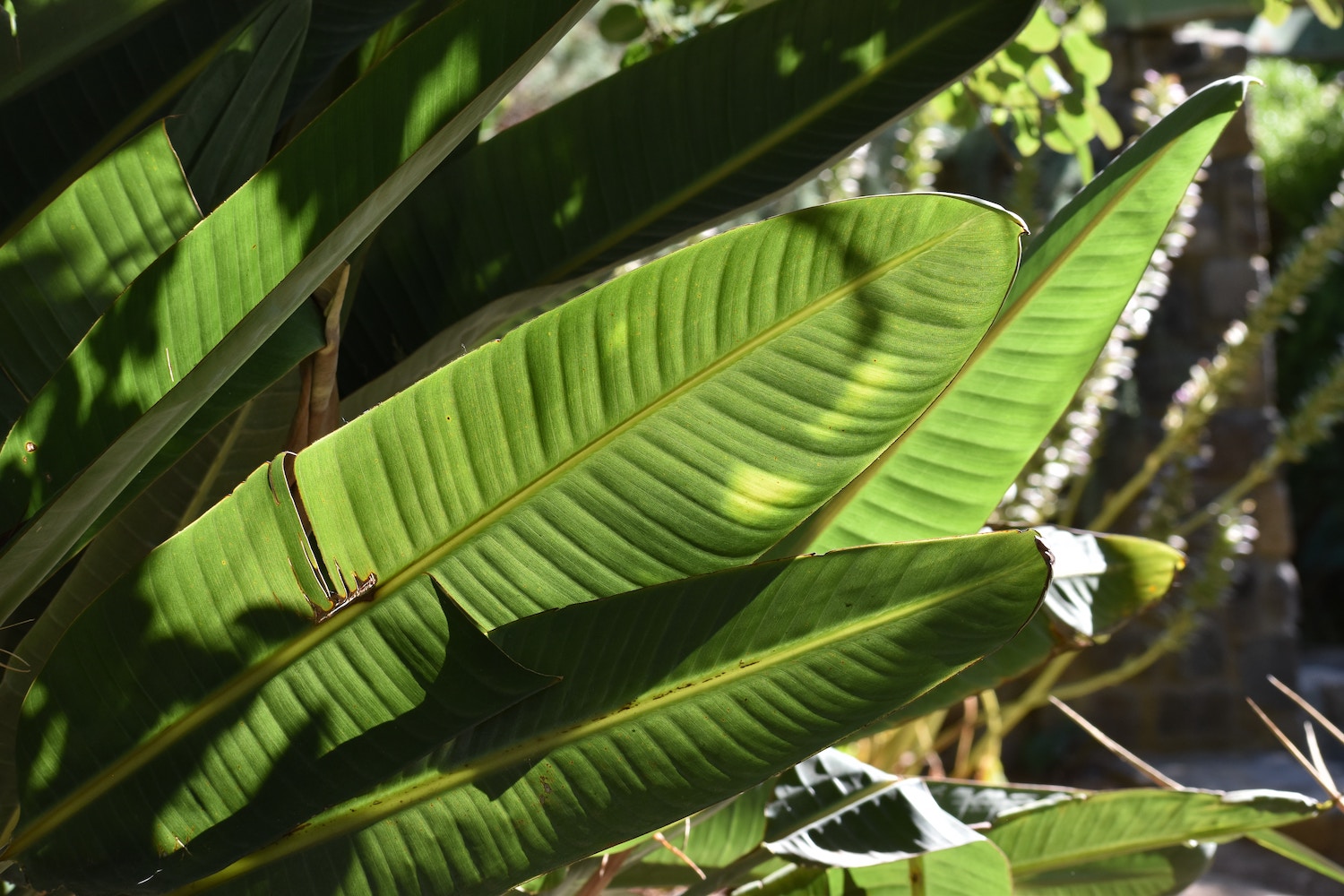interviews
Poetry Is For Everyone
Jason Reynolds on resisting the over-intellectualization of poetry and recognizing its populist potential

I first met Jason Reynolds in 2015 at Symphony Space for a memorial honoring the late Walter Dean Myers. At that evening’s festivities, organized by Myers’ son Christopher, we heard from an array of writers and musicians who knew and were nurtured by Myers’ breadth of work. Early on in the night a statuesque Black man clad in black recited poems in Myers’ honor. His words reverberated throughout the dimly lit space. This was Jason Reynolds.
Jason’s poetry and delivery are his signature: booming, powerful, pointed, each word meticulously chosen for impact. Two years after that introduction, this voice has made him one of the most lauded contemporary authors for young people’s literature. His style, delivery, and work ethic have also lead to him being a National Book Award finalist, winner and honoree of numerous Coretta Scott King awards, and four-time New York Times bestseller. His latest bestseller, Long Way Down, a novel in verse, was also longlisted for the National Book Award. When I sat down with him during a whirlwind tour, he discussed how poetry has produced some of the most politically charged writing and how it dictates his methods for prose.
Jennifer Baker: I primarily see you as a poet. So, as a poet, how hard is it to construct a novel in verse?
Jason Reynolds: Novel in verse is not the same as a novel in poetry. That’s like calling Romeo and Juliet poetry.
JB: Which people do.
JR: Really it’s just a play in verse. Hamlet is a play in verse, it isn’t an epic poem. It’s just in verse. And I think what you can do with verse — because of the sort of suspension of rules — you can kind of fool around with format in a different way. You can play with language in a way that you can’t always do with prose. It literally becomes more of an art project for me. So in terms of if it’s difficult to write it, I think that the rules of narrative stay the same.
When you write a novel in verse, you realize how many extra words we write in prose that aren’t always necessary.
When you write a novel in verse and you do it well, you’re trying to write something that’s nuanced and complicated. I think you realize how many extra words we write in prose that aren’t always necessary. You can really trim and trim and trim when you’re writing in verse. There’s a lot that you don’t have to say. And that doesn’t mean your story has to suffer. In Another Brooklyn Jackie didn’t even write adjectives into the book. That’s where the genius lies in people like her. I think that’s where the genius is in the manipulation of language. When you’re writing in verse it’s literally about every word counting. I’ve edited this book more than any other book.
JB: I was taught poetry as specific form, this specific structure, the wording and symbolism, all that stuff, that we lose when we don’t see poetry in its many forms. I was taught the old standbys like Emily Dickinson, Shakespeare as poetry, and Yeats. It can make it feel less accessible in a way, and accessibility can mean different things to different people.
JR: One of my favorite poets is Countee Cullen, and he only wrote in tight form. But it’s powerful stuff. It hits you, every single one. And I think of Lucille Clifton who wrote these really short poems. She was the master of brevity. You may get five or six lines but it’s a gut punch. It may not be a particular structure like a sonnet or a sestina, but that also doesn’t mean that when structure doesn’t have a name it’s not structure. The danger in talking about free verse the way we normally do, we typically don’t complicate the structure of free verse. What it does is it strips the poet of agency and decision-making. There is a structure. That poet chose to break a line here or add a stanza. To punctuate or not punctuate. And that constitutes the structure of that piece.
I think accessibility has less to do with form and more to do with the poet’s ability to articulate a specific narrative. Or to be free enough to break form when form can’t fit function. In Long Way Down there are a few poems that are structured, structured poems. One of them has a tight rhyme scheme. And most people don’t know it’s there. But I put it in there because I think poetry is all the things. I think it’s a haiku. It’s a sijo. I think it’s a sonnet. I think it’s free verse. It’s three lines or five lines or a paragraph.
JB: When I spoke with Jesmyn Ward, she found when she taught undergraduates that everyone was versed in the classics in the academic atmosphere. It’s that we have to choose to learn about what’s contemporary and use that as comparison to the classics. Which is inspired by the classical, yet we do need to know about Danez Smith, Tommy Pico, Morgan Parker…
JR: And Ocean Vuong. For sure. Let’s read whoever from the past and let’s read Terrance Hayes, art about grief. Or let’s read [Edgar Allan] Poe about grief and see what’s changing over time is the form, the language, perhaps the syntax.

All of Danez Smith’s class, the Danez Smith’s, the Saeeds [Jones], Solmaz Sharif, Safiya Sinclair. I mean these people are killing it. Even Claudia Rankine’s stuff. They are reframing what poetry is. And their work is derivative, to me at least, of the ‘70s Black Arts Movement with the fearlessness of Sonia [Sanchez] and [Amiri] Baraka. Baraka wrote pow pow pow. He wrote onomatopoeia in poems that he took from comic books as a kid. He was inspired by that. And I think what does it mean to be able to write pow pow pow? Well, I think 40 years later you get Danez Smith. You get people who have a certain level of irreverence, a fearlessness.
JB: I also think about the stories that poetry tells. What would you tell the person who writes prose to get them into poetry? What I keep noticing with some prose writers, or simply non-poets, is there’s a fear (or intimidation) of poetry and I’m not sure where that comes from —
JR: That comes from the classics. It comes from the over-intellectualization of poetry from the classics.
JB: But isn’t prose over-intellectualized too?
JR: It’s all over-intellectualized. But I think that the poet has always been seen as the intellect of the literary community. The poets were supposed to be the scribes of all the things. The poets were the leaders of the literary community for a very, very long time. And so, I think it just comes from the echelon this BS caste system that’s carried over. I think it’s that nonsense on top of racism, which is always there, on top of the undervaluing or de-valuing of diverse voices. The truth is Gwendolyn Brooks’ “We Real Cool” should be considered a classic. “We Real Cool” is familiar, it’s accessible. It’s interesting.
In poetry you have to know how to create stakes and in poetry you only get a little bit of space to create stakes.
What I would say though to a prose writer is I look at [poetry] as this is the ballet. You learn ballet and you can do other dances because you learn the discipline. You understand a sort of form, body, strength, muscle. But that’s what poetry is. It doesn’t mean you only have to write ballet though. Nor does it mean ballet is something that can’t be perverted or muted and flipped on its head. That’s what poetry is to me. And it’s the greatest thing that I learned how to do because it helped me learn how to write prose.
I approach the page in a specific way because I write poetry. I know how to enter, I know to exit. In poetry you have to know how to create stakes and in poetry you only get a little bit of space to create stakes. I know I’m not afraid to repeat. There’s no literary device I can’t do. I want to repeat the same word ten times. If I want to break a line in the middle of a paragraph to prove a point. If I want to jump down three lines for effect I will do that in prose because I know what it does for poetry. For me, poetry is the most distilled version of how the brain works, if it’s done right. If you can figure out how to do that right than you can implement that into your prose.
How do you create moments of trauma? How do you create moments of urgency? In poetry you’d almost create jab-like words, you’d break the line over and over again. Perhaps there’s only one word in a line, perhaps you stagger the lines. There are ways to do that in poetry that you can also do in prose. It’s actual poetic license.
JB: Thinking about what you said with the poet starting out as the thinker, we move into prose or even books as entertainment, which is fair as a form of entertainment as well as a form of education. I think in comparison to how it’s presented that becomes intimidating to some.
Poems that are the most abstract are coming from people who had the freedom to write with ambiguity, and that was rarely Black people.
JR: But there are so many different markers on that spectrum that have to be discussed. Let’s pick Shakespeare. Shakespeare’s been over-intellectualized historically. But the truth is when he was writing it at the time he was writing it for lay people. They were basically called, now, reality TV shows, sitcoms, or soap operas. That’s what he was writing, sort of pulp with jabs at the royals. But it was pulp back in the day that we over-intellectualize now. Take Langston [Hughes]. “Life for me ain’t been no crystal stair,” there’s a directness to that. There is nothing about that that is vague or ambiguous. In so many of those during the movements when people of color were writing poems, whether it be the Black Arts Movement, the Harlem Renaissance, whether it be Pablo Neruda or poetry of the exile — we can run a list — typically the poems that are the most abstract or vague are coming from the people who had the freedom to write with ambiguity, and that was rarely Black people. We still rarely make art that is ambiguous. There’s no freedom to do so. There’s no space to risk the people that we’re writing this for to understand it. I actually think we’ve been working in that tradition of accessible poems for a very long time. So for people who say they don’t understand it, it’s like “Yo, you just haven’t read the right poetry.”
JB: If you have had time to read this year, what poetry has stuck for you? I’d highly suggest Nature Poem by Tommy Pico.
JR: T’ai Freedom Ford. Her new book is brilliant. I mean so good. So good. Solmaz’s Look. Safiya Sinclair. Looking forward to reading Kevin’s [Young] joint. Danez. Liz Acevedo’s “Beastgirl.” She has a novel in verse coming out but she has a chapbook and it is dope. A little bit of everything. I don’t have time to read, but I try to jump in there.









